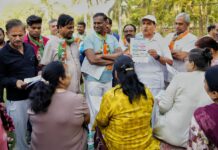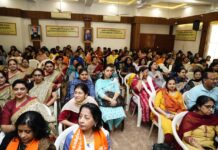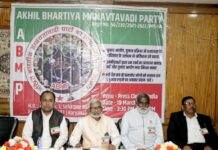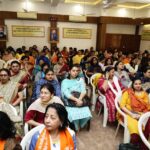Gyan Prakash New Delhi
BANGLADESH/ INDIA , UNICEF hosted parliamentarians from the entire South Asia region in an effort to increase investment in children and young adults, bringing about much needed change for millions of poor and improving the prospects for healthy economic growth in the region. The South Asia Parliamentarian Platform for Children was held in Dhaka,Bangladesh, on 2–3 May 2018 and aims to strengthen opportunities for children in the first two decades of their lives. Lawmakers from all eight countries in South Asia met to prioritize, promote, and safeguard children’s rights and discuss the prospects for further investment in Early Childhood and adolescent years. Over thirty parliamentarians from eight countries – Nepal, Bangladesh, Sri Lanka, Pakistan, Bhutan, Afghanistan, Maldives and India – participated in the conference. “While South Asia is home to one fourth of the world’s population, its share of global income is just 4 per cent. This fact underlines one of the biggest challenges for South Asia’s progress on the social and economic front: namely the lack of investment in its largest asset, its Human Capital – and especially the young within the society,” said Ms Jean Gough, Regional Director of UNICEF South Asia. Ms Heena Gavit, Member of Parliament, BJP, Lok Sabha from Nandurbar, Maharashtra, Mr Konda Vishweshwar Reddy, Member of Parliament, TRS, Lok Sabha from Chevella, Telangana and Professor Azmeera Seetaram Naik, TRS, Mahbubabad, Telangana, represented India at this meet. The three Members of Parliament interacted with the Speaker of the Bangladesh Parliament, Ms Shirin Sharmin Choudhury, and parliamentarians from seven other countries. Speaking on the need for greater investments for children and adolescents, Heena Gavit said, “The children and youth represent not just India’s future but are an integral part of securing India’s present. As the quality of human capital is one of the key determinants of economic growth, it is important for any Government to focus on enhancing child budgeting with an aim to improve healthcare and nutrition for young children and adolescents. The budget outlays for nutrition in India increased to INR 3,45,238 crore in 2018-2019 BE from INR 3,09,272 crore in 2017-18 RE.1 The outlay is 1.8 per cent of GDP. An increase in the allocation of National Nutrition Mission and Integrated Child Development Services will address the malnutrition problem of 36 per cent underweight and 38 per cent stunted children in India,” Ms Heena added. Commenting on the importance of budgeting for children for improved water and sanitation, Mr Konda Vishweshwar Reddy said, “Children are a vulnerable group that unfortunately do not have a right to vote. Politicians need to re-align their political interest with the goals of children, to reap the dividend from these young citizens 0-18 years of age. They represent nearly 40 per cent of India’s population. Clean water, toilets and hygiene is essential to ensure children survive and thrive, and achieve the Sustainable Development Goal 4.” Professor Naik, emphasizing that the education of children deserves greater investment, said, “Quality education is the basic need for every child in the country. Education is an important component of India’s national budget. The Government of India has established special schools to increase enrollment of children from marginalized sections such as Eklavya, Kendriya Vidyalaya, Kasturba Gandhi Balika Vidyalaya, Jawahar Navodaya and Mini Gurukuls, To achieve sustainable progress in the sphere of child education, a holistic approach is crucial.”
This year’s meeting focused on the region’s commitment to increased investment in children. 300 million children in South Asia are so-called multi-dimensionally poor with too little to eat, a high risk of falling sick from preventable disease and a very slim chance of ever going to school. Evidence shows that investment in young people pays strong dividends to society. One dollar invested in quality Early Childhood Development will give a return of between US$6 and 17. If low- and middle-income countries ensured preschool enrollment to half of the country’s children, the result could be cumulative lifetime earnings gains of US$15 – 34 billion. The urgent, timely and adequate investments in early childhood and adolescent years will lead to well-developed brains and a highly productive workforce. UNICEF South Asia is honored to bring together law makers to discuss the increased need for investment for the most marginalized children. “There are very good chances for bringing about radical and important change: in most countries in the region, children and young people make up a large part of society and even smaller investments now will give good results for children and South Asian societies”, said Ms Jean Gough of UNICEF South Asia.

















